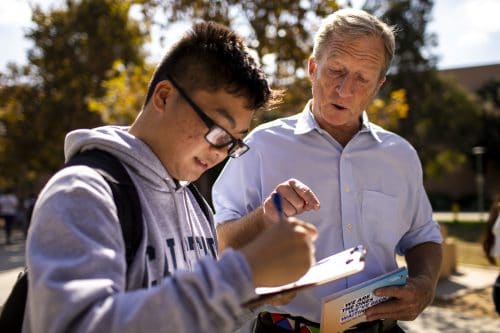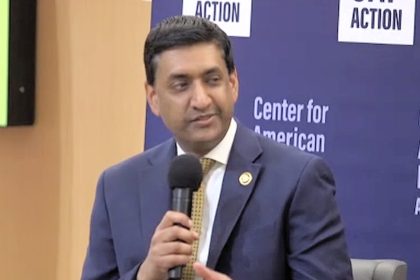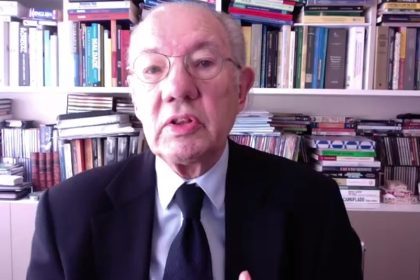Youth Voter Engagement Could Change Landscape of the Nation

WASHINGTON — The 2020 national election saw a dramatic increase in turnout for the entire electorate. What surprised many is that a higher-than-ever percentage of that increase came from young people.
Young people turned out to vote in near-record numbers, their engagement played a significant role in determining the outcome of the election, and youth organizers believe that this was just a sample of Gen Z’s voting power for years to come.
Hosted by the Center for American Progress’ youth engagement arm, Generation Progress, the liberal advocacy organization convened a panel of youth vote mobilizers and civic engagement analyzers to discuss what the shifting makeup of the country might mean for future elections.
“Our generations are showing up and speaking out. Any candidate that wants to win in the future will need our support,” insisted Lt. Gov. Mandela Barnes, D-Wis., the youngest lieutenant governor in the country.
“Historically, young people have turned out in [smaller numbers] than older generations,” said Barnes, pointing out, however, that Millennials and Gen Z now make up the largest share of the electorate. “Young people have the potential to be leaders at every level and at every age… [and the youth vote] is critical to preserving the progressive future we all deserve.”
Panelists agreed that it is time that we retire the worn-out narrative that young people are too disengaged to vote.
“It’s not that surprising given how much young people have been organizing… on really important issues they care about,” offered Abby Kiesa, deputy director of the Center for Information & Research on Civic Learning and Engagement. CIRCLE has two decades of work providing data and insights on youth civic engagement and impact including early indicators and analysis of the recent election.
“It’s about access, not apathy,” Kiesa said, suggesting that youth voter disengagement is now a myth.
Another fallacy she claims CIRCLE’s data seems to correct is that “movement and issue work are different than voting work.” Developing young progressive constituencies takes years, and she said there are “indicators that youth organizations have been working nationally ahead of time,” not just in the moments before the election.
Data shows that young voters are motivated by issues that have motivated progressives for a long time, including climate, housing, and health care. Given their interest in these issues, young people are primed to be a priority constituency for progressives, but youth advocates insist that, despite which side of the aisle, parties need to engage with young voters in real, non-transactional ways.
“You have to ask,” said Malik Hubbard, senior advisor at NextGen America. Hubbard said that discussions about investing in their communities are usually well-received and that gains are made by “walking people through building trust.”
“Don’t make assumptions that young people are going to be with you,” he added. “Engage properly; the longer you wait, the more extensive investment [will be] needed.”
Youth organizing advocates also offered that sometimes young people disengage civically due to doubt that their views will be heard or that they can make a difference, but the opposite happened this year. A backdrop of racial justice uprisings, a pandemic, and an economic crisis likely played a role in that.
The pandemic broadly shifted how campaigns were run. With businesses and politicians struggling to figure out how to engage people in this climate, the nation defaulted to digital-based engagement, which young people generally prefer… and dominate.
“Young people were controlling the narrative, not only about how we see this country, but how we can make it better,” said Hubbard, adding that digital strategies used in the 2020 campaign may yield a model moving forward. “If you didn’t invest in digital organizing, you didn’t invest… in young people. [And] like anyone else, [young voters] have to figure out who they can trust.”
“We have to get beyond soundbites. We need young people to be seen, heard, and engaged year-round and not just when [elected officials] believe it matters to their political legacy,” said Preston Mitchum, policy director at URGE: Unite for Reproductive and Gender Equity.
While young people certainly are poised to be key both to campaigning and the future of progressive policies in the United States, Mitchum offered that “none of this will matter until we have an honest conversation about the relationships we are building with people.”
“We’re tired,” he said. “We’re tired of people saying that we’re apathetic about our lives and bodies. We’re tired of engaging in a deficit. We’re tired of seeing politicians on Twitter and not passing relief. You saw a surge of youth vote particularly this year because of the political landscape. The way we engage electorally is… the way that we change the landscape of this country.”























